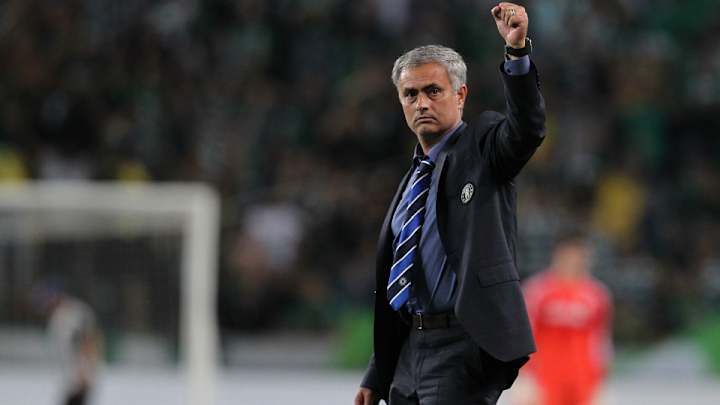Fast starts don't always pan out, but Chelsea has look of winner

Since he joined Porto in 2002, Jose Mourinho has won the league title in his second season at every club he’s managed. That, it seems, is the optimal time, when he has had a chance to embed his method in his players and before the abrasiveness of his personality has had time to sour the mood. This is his second season back at Chelsea, and, sure enough, the Blues go into Sunday’s game against Arsenal already five points clear of its closest realistic challenger.
More than that, it has already played the game that, before the season began, would have been highlighted as its hardest: away to Manchester City. It probably should have won that as well, having led against 10 men before former Chelsea star Frank Lampard’s late intervention. And had Chelsea won, it would have been hard to believe that the league race wasn’t over in September.
Despite summer optimism, signings, Arsenal's fate appears same as ever
As it is, there is still some life in the title race, although if the other contenders keep stuttering, it won’t last much longer. That said, Chelsea has made a habit of making storming starts only to stutter. In 2008-09, under Luiz Felipe Scolari, for instance, it won 10 of its first 13 games, only for a run of only four wins in the 12 that followed to derail it.
Chelsea won eight of its first 10 under Carlo Ancelotti in 2010-11 and then just one of the following eight. In 2012-13, under Roberto Di Matteo, Chelsea took 22 points from the first 24 available and then four points from the next seven games. It never pays to get too carried away with early-season form, but this seems somehow different, and not just because of the failings of the other top sides.
There is a remorselessness about Chelsea, a clear progression from last season.
• GLOCKNER: How does the EPL stack up against Europe's other top leagues?
At the beginning of last season, there were two flaws in the Chelsea side: at the back of midfield and at center forward. Even in the first half of last season, there were times when an alarming space opened up between the two center backs and the midfield. The return of Nemanja Matic in January solved that.
It may be that the Serbia international is not quite this season at the same level he was last, but that may be a tactical issue: with Oscar and Cesc Fabregas alongside him he doesn’t quite have the same defensive support he did with Lampard, but that is a matter of balance and can be tweaked as required.
Champions League: Danny Welbeck breaks out, Real Madrid survives scare
And what having Fabregas in particular in the side has brought is a dynamism and creativity through midfield and it is that, allied to the striking of Diego Costa, that has been the real difference in Chelsea this season. Costa is the perfect Mourinho forward; it would be overly simplistic to describe him as a modern-day Didier Drogba, but his function isn’t dissimilar to how Drogba played in Mourinho’s first spell at the club.
Costa is probably a more instinctive finisher than Drogba was and is awkward and angular rather than possessing Drogba’s physical prowess, but he works across the line, can hold the ball up, exhausts defenders with his constant harrying, and scores goals: eight of them so far in six league games. And yet in Costa lies the only real doubt about this Chelsea.
Four times in those six matches, he’s been substituted. His hamstring is a source of perpetual concern, having damaged it on international duty. Mourinho says that it will heal with 14 days of rest and yet, even at this stage, he’s not prepared to give him that period out of the game. His preference, rather, is to try to coax him through games, even though he acknowledges he can’t really play more than a game a week.
• BERLIN: Big gulf evident between Premier League's top and bottom
Mourinho’s openness in this regard is strange. Maybe he is just telling it as it is, although that would be uncharacteristic, or maybe he thinks he can pressure Vicente Del Bosque, the Spain coach, into omitting Costa from the squad for next week’s internationals away to Slovakia and Luxembourg, but it does perhaps reveal a doubt. What if Costa’s hamstring were to go?
The Champions League game against Schalke 04 last month suggested why that is such a concern. Drogba started and, while it would be wrong to write him off after just one game, he looked all of his 36 years. The other option up front is Loic Remy, who is a very different type of forward, a fine finisher, but all about pace and movement.
When he was at QPR, Harry Redknapp said he was forward who had to play with a partner, and changed his formation accordingly, and while that may not be strictly true, it’s certainly hard to see him leading the line as Costa has done. But for now Costa remains fit, which is bad news for Arsenal, particularly given its slew of injuries at the back of midfield.
And for as long as he remains fit, it’s had to see how this slick and robustly well-built Chelsea can be stopped.
